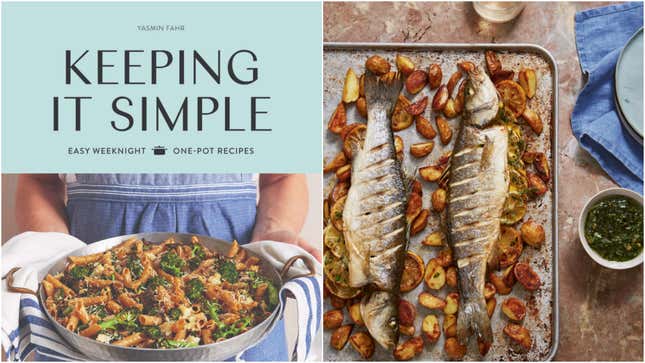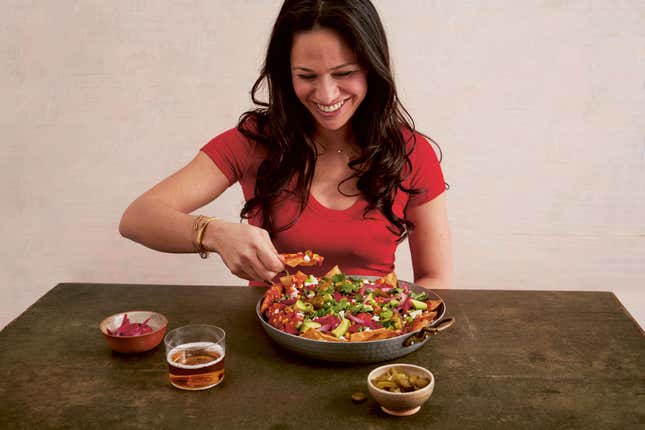
Being an adult, I have learned through long experience, is hard. This is not a novel discovery, I know. But there are some people who make adulting look easier than others. Those are the people who get up when it’s still dark outside to go to the gym, work a full and productive day at their jobs, and come home in time to cook a hot meal in between driving their kids back and forth to school and archery and soccer practice. Oh, these people also do all their laundry before they reach the point of desperation, e.g. wearing five-year-old underwear. Of all these things, the only one I do regularly is go to work.
I’m normally not one for self-improvement, not because I think I’m already perfect but because I’m lazy and also love sitting and reading and eating doughnuts too much, but this year, my sloth and poor eating during the holiday season appalled even me. I joined a gym because it got too cold to run outside, and I resolved to start making dinner for myself, responsible adult dinner that could turn into the next day’s lunch. As luck would have it, the first day of the working year, Keeping It Simple: Easy Weeknight One-Pot Recipes showed up in the mail.

This is the first book by Yasmin Fahr, who has previously contributed to Bon Appetit, Serious Eats, TASTE, and other food and recipe sites. Her goal, she writes in the introduction, “is that you’ll have dinner on the table in the time that it takes you to drink a glass of wine.” Oh, and also that there will be only one pot or pan to clean afterward. The recipes collected here are easy enough that anyone who has spent a reasonable amount of time in the kitchen can make them, but challenging enough that users will be able to pick up a few new skills.
For me, that was cooking and deboning a whole fish. There’s no reason why a whole fish should be more intimidating than a whole chicken. Fish are flatter than chickens. They have fewer parts to cut up. They do, however, have eyes that stare up at you. Maybe that’s it.
Anyway, Fahr has anticipated this fear and apprehension among her readers and has thoughtfully included an entire page with the header, “DON’T LET A WHOLE FISH SCARE YOU.” Half of it is encouragement—“Hey, this can be that thing you do today that scares you”—and the other half is precise and detailed instructions for deboning a fish.
Accordingly, one evening I picked up two branzino on my way home from work (and the gym, woo, look at me!). Once I unwrapped them from their paper, they stared up at me from the kitchen counter fishily. Per Fahr’s instructions, I cut a row of slashes along both sides of each fish; rubbed their bodies with olive oil, salt, and pepper; put them on a baking tray on a line of lemon slices; surrounded them with potatoes; and shoved the whole thing in the oven. Then there was nothing left to do, so I went to take a shower. Fahr herself keeps a hula hoop in her kitchen to occupy herself during idle moments. (I found this detail endearing.)
When the fish came out, I let them sit for five minutes, then, with some trepidation, I began the deboning. Much to my surprise, the process went pretty much like Fahr said it would. The head and tail snapped right off. The belly meat could be scraped away with a spoon. The spine and most of the bones pulled away easily from the fillet. It’s true the fillet was not as neat as it could have been (it actually fell into pieces), and there were a few pin bones left in the meat, but Fahr said a little messiness was part of the learning. Or, as she writes, “Yay, you did it! Way to go. Please send me a photo, no matter how ugly or pretty you think it is. I think you did great.” (I did not send a photo.)
When you are a grown-up, you get very little encouragement for completing basic tasks like feeding yourself. So even this little bit made me happy.
The fish itself was delicious. It was not overcooked. It did not taste fishy. I was pretty pleased with myself.
I didn’t feel as triumphant after making some of the other recipes from the book, but I guess that’s to be expected: I already know how to chop and stir. But the first recipe I tried, Weeknight Curry, did take me aback by how delicious it was. I couldn’t find the snow peas the recipe called for, so I swapped in mushrooms. The result was sweet and spicy like the panang curry at a Thai restaurant that I was addicted to in grad school. I enjoyed the Baked Chilaquiles, too; I didn’t feel like eating the chorizo the recipe called for, and since it was January, there was no corn to be had, but the final dish didn’t suffer at all for it.

And then there was the Miso-Ghee Chicken, which was truly magical. The recipe calls for you to mash together white miso paste and ghee and then shove half the mixture under the skin of some bone-in chicken thighs and massage the rest of it on the surface. The result was moist, juicy chicken with a crispy skin. It was truly astonishing. The radishes that Fahr suggests you add to the sheet pan while the chicken roasts were pretty good, too. Fahr says she also uses the miso-ghee mixture on roast turkey breast, and I’m sure it would also be great with roast chicken. (According to Fahr’s holistic facialist, it’s also good for the skin. Human skin, that is.)
Like every cookbook writer, Fahr has a definite palette (palate?) of ingredients. Hers skews toward Mediterranean flavors (lemon, Bulgarian feta, chili flakes), and if you don’t like those, you probably won’t like Keeping It Simple. If you’re cooking for more than two or three people, especially if those people have hearty appetites, the portions here can be a bit skimpy. But if you’re cooking for one or two, and you want to eat something that tastes like real food—that is, something that tastes like it required a lot more effort to make than it actually did—this is an excellent book to keep in your repertoire.